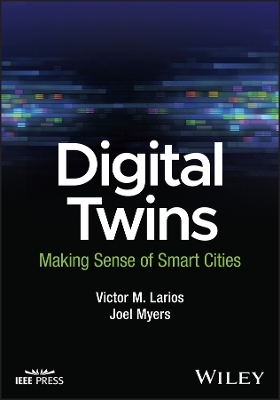
Digital Twins: Making Sense of Smart Cities
Seiten
2025
John Wiley & Sons Inc (Verlag)
978-1-119-90894-4 (ISBN)
John Wiley & Sons Inc (Verlag)
978-1-119-90894-4 (ISBN)
Authoritative and comprehensive guide illustrating best practices for designing and building resilient and sustainable smart cities
Digital Twins evaluates smart city case studies and insights from the 100 IEEE IoT Global Cities Alliance (GCA) and describes best practices and standards for designing secure architecture using IoT, IoP, and AI. Showcasing success stories while also examining common issues from smart city projects around the world, this guide unpacks lessons learned and identifies where to further integrate standards into city frameworks and processes.
Featuring chapters on water, food, energy, mobility, health, waste, education, economies, and work, the environment, social wellbeing, ethics, security, and privacy, the text demonstrates the impact of smart cities on our daily lives. The authors describe the sustainable needs for our next generation and identify the challenges and changes needed to implement smart cities.
Readers will learn about Smart City Digital Twins (SCDT), and international Urban Twins (UT), based on architecture, building information modeling (BIM), and big data, which support municipalities to digitally simulate 3D models and create scenarios to test strategies and plans for urban planning, mobility, and disaster management.
Other topics covered in Digital Twins include:
Models and open data pertaining to smart city governance, and standard requirements for architectures to integrate IoT solutions in Smart Cities
Factors and best practices for different global regions when implementing IoT Solutions and future trends and challenges as areas of opportunity
Key discussion points to keep in mind on the digital transformations of cities, such as problem solving in relation to city similarities and differences
Snapshots of five cities, covering their approach to becoming a sustainable smart city and undertaking their respective digital transformations
Representing the latest developments and future trends of IoT and smart connectivity, Digital Twins is an ideal resource for municipalities and practitioners within the field of smart cities as well as those working more broadly on sustainability and technology who wish to learn about a wealth of topics intersecting with smart cities.
Digital Twins evaluates smart city case studies and insights from the 100 IEEE IoT Global Cities Alliance (GCA) and describes best practices and standards for designing secure architecture using IoT, IoP, and AI. Showcasing success stories while also examining common issues from smart city projects around the world, this guide unpacks lessons learned and identifies where to further integrate standards into city frameworks and processes.
Featuring chapters on water, food, energy, mobility, health, waste, education, economies, and work, the environment, social wellbeing, ethics, security, and privacy, the text demonstrates the impact of smart cities on our daily lives. The authors describe the sustainable needs for our next generation and identify the challenges and changes needed to implement smart cities.
Readers will learn about Smart City Digital Twins (SCDT), and international Urban Twins (UT), based on architecture, building information modeling (BIM), and big data, which support municipalities to digitally simulate 3D models and create scenarios to test strategies and plans for urban planning, mobility, and disaster management.
Other topics covered in Digital Twins include:
Models and open data pertaining to smart city governance, and standard requirements for architectures to integrate IoT solutions in Smart Cities
Factors and best practices for different global regions when implementing IoT Solutions and future trends and challenges as areas of opportunity
Key discussion points to keep in mind on the digital transformations of cities, such as problem solving in relation to city similarities and differences
Snapshots of five cities, covering their approach to becoming a sustainable smart city and undertaking their respective digital transformations
Representing the latest developments and future trends of IoT and smart connectivity, Digital Twins is an ideal resource for municipalities and practitioners within the field of smart cities as well as those working more broadly on sustainability and technology who wish to learn about a wealth of topics intersecting with smart cities.
Victor M. Larios, PhD, is Full Professor and Director of the Smart Cities Innovation Center at the University of Guadalajara and Leader of the IEEE IOT Community Global Cities Alliance Latin America. He received his PhD and DEA in Computer Science at the Technological University of Compiègne, France, and an Engineering Degree in Electronics at ITESO University in Mexico. Joel Myers is CEO of DOMILA LTD, Ireland; Chair of Smart Cities for the IEEE IoT Initiative; and Chair of the IEEE IoT Global Cities Alliance initiative.
| Erscheinungsdatum | 16.12.2023 |
|---|---|
| Verlagsort | New York |
| Sprache | englisch |
| Gewicht | 666 g |
| Themenwelt | Informatik ► Theorie / Studium ► Künstliche Intelligenz / Robotik |
| Informatik ► Weitere Themen ► Hardware | |
| Naturwissenschaften ► Geowissenschaften ► Geografie / Kartografie | |
| Technik ► Elektrotechnik / Energietechnik | |
| ISBN-10 | 1-119-90894-9 / 1119908949 |
| ISBN-13 | 978-1-119-90894-4 / 9781119908944 |
| Zustand | Neuware |
| Haben Sie eine Frage zum Produkt? |
Mehr entdecken
aus dem Bereich
aus dem Bereich
Buch | Softcover (2024)
REDLINE (Verlag)
20,00 €
Eine kurze Geschichte der Informationsnetzwerke von der Steinzeit bis …
Buch | Hardcover (2024)
Penguin (Verlag)
28,00 €


